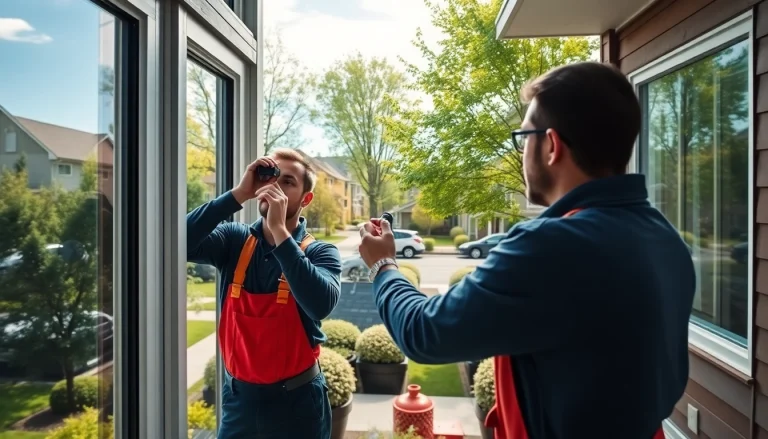
Understanding Common AC Issues in Glendale AZ
As temperatures rise during the summer months in Glendale, AZ, reliable air conditioning becomes crucial for your comfort. However, issues with your AC system can lead to discomfort and increased energy bills. To help you better understand the nuances of ac repair glendale az, we will look at common problems, signs of failure, and seasonal maintenance tips.
Identifying Signs of AC Failure
Knowing when your air conditioning system is on the verge of failure can save you from emergency repairs and elevated living costs. Common signs of potential AC problems include:
- Inconsistent Cooling: If some rooms in your home are warmer than others, it could indicate a refrigerant leak or duct problems.
- Odd Noises: Rattling, buzzing, or clanging noises coming from your AC unit can indicate loose parts or motor issues.
- Increased Energy Bills: A sudden spike in your energy bill can signal that your AC is working harder than necessary because of inefficiency.
- Unpleasant Odors: Moldy or burning smells can be a sign of an underlying issue such as electrical problems or mold growth within the unit.
Frequent Problems Encountered by Homeowners
Homeowners in Glendale frequently encounter issues that, if not addressed promptly, can escalate to more significant problems:
- Refrigerant Leaks: Low refrigerant levels can prevent your system from cooling effectively. It’s essential to have leaks diagnosed and patched quickly.
- Dirty Filters: Clogged filters restrict airflow, forcing your system to work harder and leading to increased wear and tear.
- Electrical Failures: Electrical issues such as faulty wiring or capacitor failure could lead to system shutdowns or even dangerous situations such as fires.
- Compressor Failure: This is the heart of your AC system; a failing compressor often means costly repairs or unit replacement.
Seasonal Maintenance Checklist for Your AC
Regular maintenance is crucial in ensuring your AC operates efficiently and effectively. Here’s a seasonal checklist you can follow:
- Check and replace air filters every 1-3 months.
- Clean the outdoor condenser unit and remove debris.
- Inspect the ductwork for leaks.
- Schedule a professional tune-up before summer.
- Evaluate the thermostat for accuracy.
Choosing the Right AC Repair Service in Glendale AZ
When faced with a malfunctioning AC unit, selecting the right repair service is crucial. This decision can greatly impact the quality of service and your overall satisfaction.
Qualities to Look for in an HVAC Technician
When hiring an HVAC technician in Glendale, consider the following qualities:
- Licensing and Certification: Ensure the technician holds appropriate licenses and certifications, demonstrating their training and expertise.
- Experience: Look for professionals with a proven track record in AC repairs specifically within your region.
- References and Reviews: Check online reviews and ask for references to gauge customer satisfaction.
- Transparent Pricing: A reputable service provider should offer clear and upfront pricing, with no hidden fees.
Comparing Service Costs and Value
When obtaining quotes from different service providers, it’s vital to compare not just the costs but the value you receive. Different technicians may have various service packages that include:
- Emergency services outside regular hours.
- Comprehensive warranty options on parts and labor.
- Preventive maintenance plans that help avoid costly repairs.
Understanding what is included in the price you pay can provide a more significant return on investment over the lifespan of your AC system.
Questions to Ask Before Hiring
Before finalizing your decision, consider asking your potential AC repair service these questions:
- How long have you been in business, and do you specialize in AC repairs?
- Can you provide references from previous clients?
- What preventive maintenance services do you offer?
- Do you offer a written quote before starting any work?
DIY AC Repairs: What You Can and Cannot Do
While many homeowners wish to save costs by tackling repairs themselves, it’s essential to know the limits of DIY fixes.
Simple Fixes for Quick Relief
There are a few minor repairs you can perform without professional help:
- Replacing or cleaning air filters.
- Checking and replacing batteries in thermostats.
- Cleaning debris around the outdoor unit.
When to Call a Professional
Certain issues require advanced knowledge and tools, such as:
- Refrigerant leaks or charging.
- Electrical issues like faulty wiring.
- Compressor failure or complex mechanical problems.
Safety Precautions During Repairs
Always prioritize safety when conducting any AC repairs:
- Turn off power to the unit before starting any work.
- Use insulated tools, especially when working with electrical components.
- If in doubt, consult a professional.
Preventive Maintenance for Your AC System
Investing in preventive maintenance can extend the life of your air conditioning unit and improve efficiency.
Maximizing Efficiency in Your AC
Regular maintenance not only reduces the likelihood of sudden breakdowns but can also lead to improved efficiency and lower energy bills. Scheduled check-ups can identify potential issues before they exacerbate.
Benefits of Regular Tune-Ups and Inspections
Some benefits of consistent maintenance include:
- Increased lifespan of the unit.
- Improved indoor air quality.
- Higher energy efficiency, reducing overall operating costs.
- Early detection of minor problems, preventing larger issues.
Common Myths About AC Maintenance
There are several misconceptions surrounding AC maintenance. Some of these myths include:
- Myth: Maintenance is unnecessary if the AC is working fine.
- Myth: All repairs should be made by professionals.
- Myth: It’s fine to skip filter changes if the unit seems to be cooling.
Future Trends in AC Technology for Glendale AZ Homes
The HVAC industry is constantly evolving with innovative technology aimed at improved efficiency and convenience.
Energy-Efficient Units and Their Benefits
New energy-efficient air conditioning systems utilize advanced technology such as variable-speed compressors, which not only reduce energy consumption but can also result in long-term savings for homeowners.
Smart Home Integration for HVAC Systems
Smart technology is now integrated into HVAC systems. Features like remote-controlled thermostats and energy monitoring apps provide homeowners with control over their energy use and comfort, making it easier to adjust settings even from afar.
Preparing for Climate Changes in AC Design
With changing climate patterns, HVAC technology is adapting to maintain comfort in a variety of conditions. Systems are being designed to operate efficiently even in extreme heat, ensuring reliable cooling solutions for all climates.






